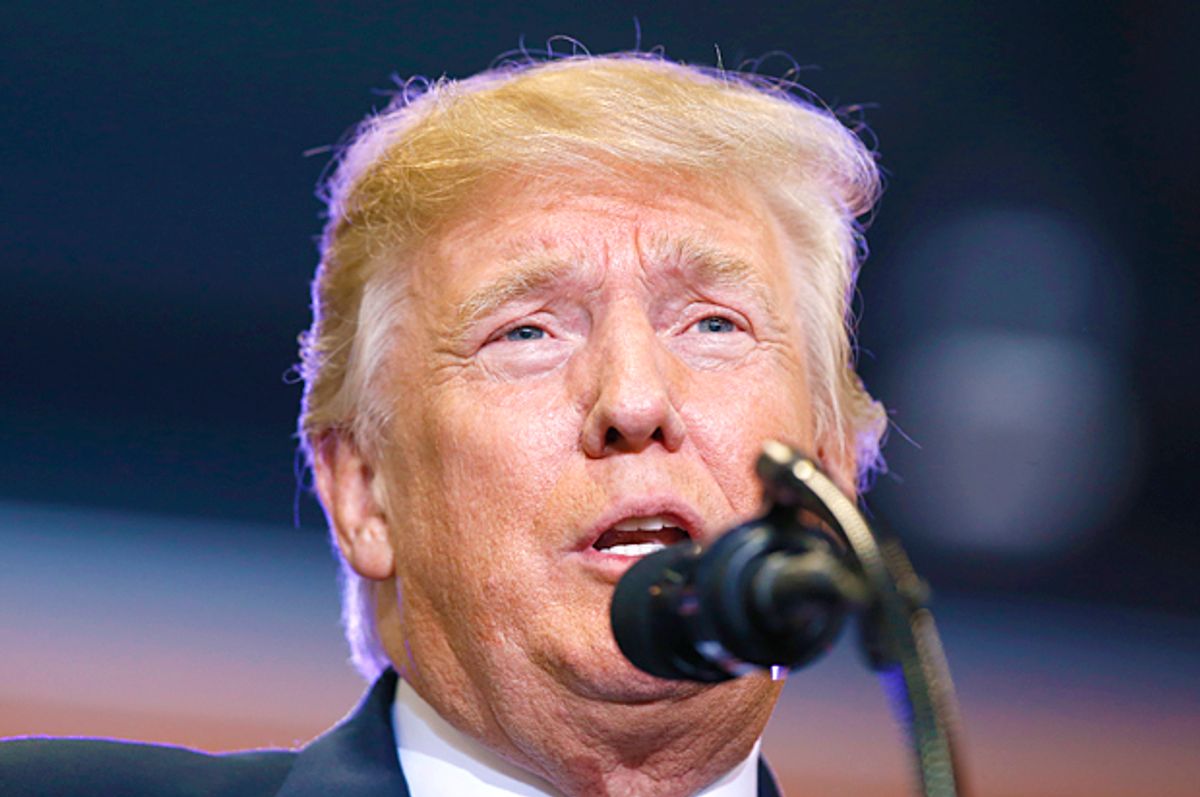In the interview that likely got Steve Bannon fired from his position as President Donald Trump's strategist, the once and future Breitbart News chief proclaimed his glee with seeing Democrats talk about racial and other "identity politics" issues.
“The Democrats, the longer they talk about identity politics, I got ’em," Bannon told American Prospect co-editor Robert Kuttner. "I want them to talk about racism every day. If the left is focused on race and identity, and we go with economic nationalism, we can crush the Democrats.”
A look at recent polling about Confederate memorials, the source of much recent agitation on both left and right, seems to suggest that Bannon has more of a point than many of his critics may want to admit.
Very few Americans have shown any interest in going to protest events in support of keeping statues to various figures of the secessionist movement. But it's equally true that the idea of removing Confederate memorials doesn't attract much support either. Here are some data points:
- A survey released Aug. 29 by Florida Atlantic University of registered voters in the Sunshine State found that 49 percent of respondents favoring keeping Confederate statues in public places, while 30 percent wanted them removed and 21 percent were unsure
- HighGround Public Affairs, an Arizona-based Republican campaign firm, released a survey Aug. 24 which showed that 62 percent of respondents believed that a memorial to Arizonans who fought for the Confederacy should "definitely" or "probably" be kept in place. Meanwhile, 32 percent of respondents said the memorial should be removed.
- A survey of registered voters conducted Aug. 17 through 19 released by Morning Consult and Politico found that 52 percent said that they felt the statues should "remain standing."
- NPR and PBS published a survey conducted Aug. 14-15 that found 62 percent of respondents believed Confederate monuments should "remain as a historical symbol" compared to 27 percent who thought they should be removed.
Some conservatives have interpreted these and other results as indicative of public support for Confederate memorials. But in truth, most of the polling on this issue has been excessively simplistic.
As Ariel Edwards-Levy, polling director of the Huffington Post, noted earlier this month, commenting on other surveys showing similar results to the ones mentioned above: "The way the question is framed may make a significant difference."
Citing a survey of registered voters conducted Aug. 18-21 by Public Policy Polling, a Democratic firm, Edwards-Levy noted that when the question was framed as "relocating" the monuments to museums or historic sites rather than "removing" them, 58 percent of respondents were in favor of the idea.
Beyond being more favorable to opponents, that wording is a fairer representation of what most politicians who want the statues removed have actually proposed and carried out, everywhere from South Carolina to New Orleans.
The different results between the PPP survey and the others mentioned above suggests that the fuzzier President Trump and other supporters of retaining Confederate memorials can make the issue, the better it can be leveraged as a motivator for far-right voters, while also stoking moderate fears of left-wing authoritarianism or excessive "political correctness." In short, it helps Bannon and Trump to troll liberals into paroxysms of rage and emotion, rather than allowing them to present their arguments against the memorials in a clear and rational manner.
"They’re trying to take away our culture, they’re trying to take away our history," Trump declared at a rally in Phoenix last month. He did not bother to mention that the Confederate memorials in the Grand Canyon State were all erected in the 20th century or later, one of them as recenly as 2010.
Even if Trump had known that fact, he would never have mentioned it. Doing so would violate the important troll technique of pretending to have no idea what your opponent is actually discussing or proposing, in order to provoke irrational arguments or long recitations of facts that neutral observers may find annoying. Trump has also encouraged this by falsely claiming that liberals want to remove statues to George Washington, Thomas Jefferson and other founding fathers who owned slaves.
Trolling liberals is a technique specifically encouraged by far-right libertarian economist Hans-Hermann Hoppe, as in this 2013 discussion about returning to the gold standard.
"Don't get involved in technical details, but ask them questions almost like a child," Hoppe told a supporter.
Not all Democrats have fallen for the troll, however. Paul Begala, a veteran Democratic strategist, seemed well aware of what was going on in an interview with The New York Times earlier this month. Fellow Democrats were “driving straight into a trap Trump has set,” Begala said, when they allowed the president to shift the focus of the debate.
Shortly after Trump's irascible Aug. 15 press conference at Trump Tower, Bannon revealed what was going on in another interview (also with the Times) that received less attention but was every bit as important as the one he gave to Kuttner.
“President Trump, by asking, ‘Where does this all end’ — Washington, Jefferson, Lincoln — connects with the American people about their history, culture and traditions,” Bannon said.
“The race-identity politics of the left wants to say it’s all racist,” Bannon continued. “Just give me more. Tear down more statues. Say the revolution is coming. I can’t get enough of it.”
Bannon and Trump's strategy of using Confederate monuments as a means of deflecting attention from the GOP's unpopular views on taxes, health care and domestic spending is nothing new. It is, in fact, another application of the "cultural populism" that Republicans have utilized to win elections for decades.
In the long run, this practice of symbolic politics has essentially made it impossible for conservatives to actually enact their own agenda while also creating a sizable white nationalist cohort within the GOP. In the short run, however, seeking to "trigger" liberals over and over again continues to pay political dividends.



Shares